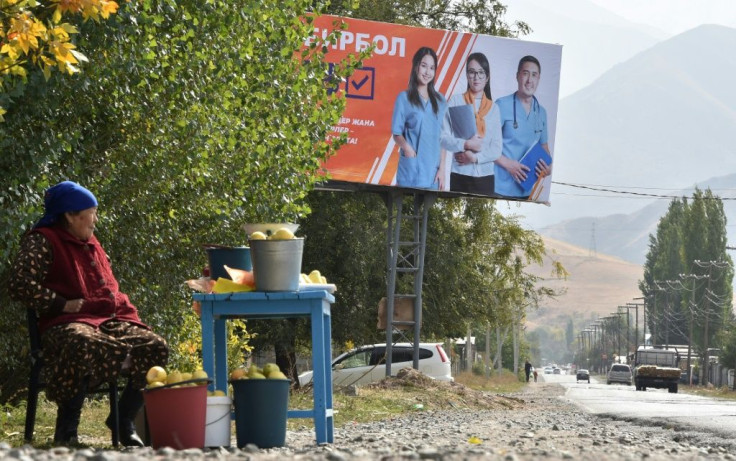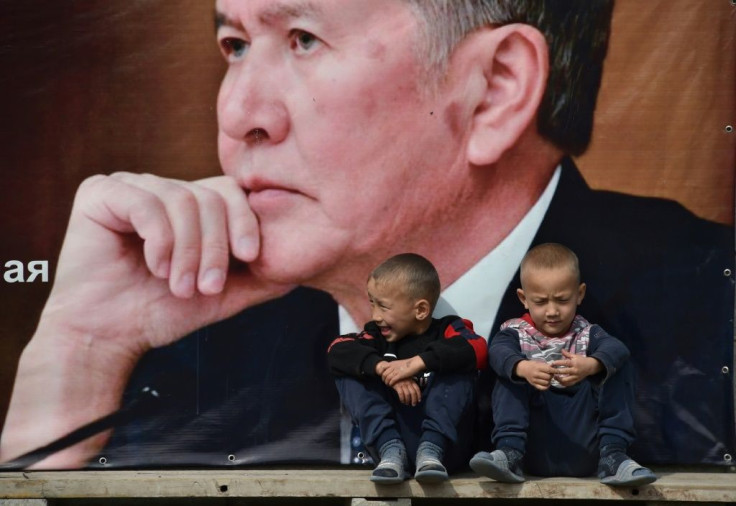Kyrgyzstan Set For Election As Vote-buying Fears Rise
Kyrgyzstan goes to the polls to choose a new parliament on Sunday with voters and smaller parties afraid vote buying will spoil a rare competitive election in former Soviet Central Asia.
Surrounded by authoritarian states with rubber-stamp legislatures, elections in mountainous Kyrgyzstan offer a colourful and sometimes unpredictable contrast.
Yet with the coronavirus pandemic battering paltry incomes, many are warning that the stage is set for massive ballot fraud by well-resourced parties.
Rita Karasartova, a candidate for the outsider Reforma party, which has pledged to push for an overhaul of corrupted state structures if it reaches parliament, told AFP she "wanted to believe" the election would be a battle of ideas rather than cash.
"But after the coronavirus, our economic situation is very difficult," she said. "Pro-government parties are extremely rich and I think they are buying up votes in the villages."

Of sixteen parties competing, two are almost certain to take seats in the 120-member legislature.
The Birimdik party is viewed as loyal to President Sooronbai Jeenbekov and includes the president's brother and former parliamentary speaker Asylbek Jeenbekov among its candidates.
Its main rival, Mekenim Kyrgyzstan, is associated with the powerful Matraimov family, whose figurehead Rayimbek Matraimov -- a former Customs Service official -- was the target of anti-corruption protests last year.
Both parties have spoken in favour of further integration with the Russia-led Eurasian Economic Union bloc that has raised the status of hundreds of thousands of Kyrgyz migrants working in Russia since Kyrgyzstan joined in 2015.
But Birimdik's party chairman Marat Amankulov sparked indignation after comments emerged from last year of him saying it was "time to return" to Moscow's fold, causing rivals to accuse him of undervaluing Kyrgyz independence.
In a meeting with Russian leader Vladimir Putin in Sochi on Monday, Jeenbekov warned of "forces" that wanted to "drive a wedge into the (Kyrgyz-Russian) alliance" -- an apparent reference to a pro-sovereignty rally held in opposition to Amankulov's comments in the capital Bishkek last Sunday.
One participant at the 300-strong rally, 56-year-old Sabira Sutenirova, told AFP Birimdik was "buying votes for 2,000 soms ($25)" just outside the capital where her relatives live.

"They want to sell our country," Sutenirova claimed.
Amankulov has said his comments about Russia were taken out of context.
A legal representative of Birimdik told AFP by telephone that the party "does not engage in vote-buying" or put "administrative pressure" on voters.
Revolutions unseating two authoritarian presidents in the space of five years were seen as the driving force behind a fresh constitution to curb authoritarian excess and contain political infighting in 2010.
Electoral laws dictate that no one party can take more than 65 seats in the 120-member legislature.
Presidents are limited to a single six-year term -- a departure from the strongman trend seen in neighbours China, Kazakhstan, Tajikistan and Uzbekistan.
Jeenbekov will be hoping for a cooperative parliament as he plans for life after his term ends in 2023, knowing that his own predecessor and former protege Almazbek Atambayev is currently languishing in jail.
Tensions between the pair built following Jeenbekov's electoral victory in 2017, peaking last year with a shootout at Atambayev's residence that pitted the former president's armed supporters against state security forces that were trying to arrest him.
Atambayev was detained on charges of illegally releasing a crime boss from jail, an offence he was sentenced to 11 years imprisonment for in June.
He has also been charged in the murder of a special forces officer who died during the raid.
But these high-stakes political dramas were far removed from the concerns of Bishkek residents this week, who were keen to focus instead on corruption, low salaries and the pandemic that tore through the country during the summer in pre-election interviews with AFP.
Eldiyar Temir, a 24-year-old student, said he was considering voting for the nominally opposition Ata-Meken party, but did not see a future for himself in Kyrgyzstan.
"I see other countries that are innovating, digitising... I will stay here a while, and then leave for somewhere else," the student told AFP.
© Copyright AFP 2024. All rights reserved.




















